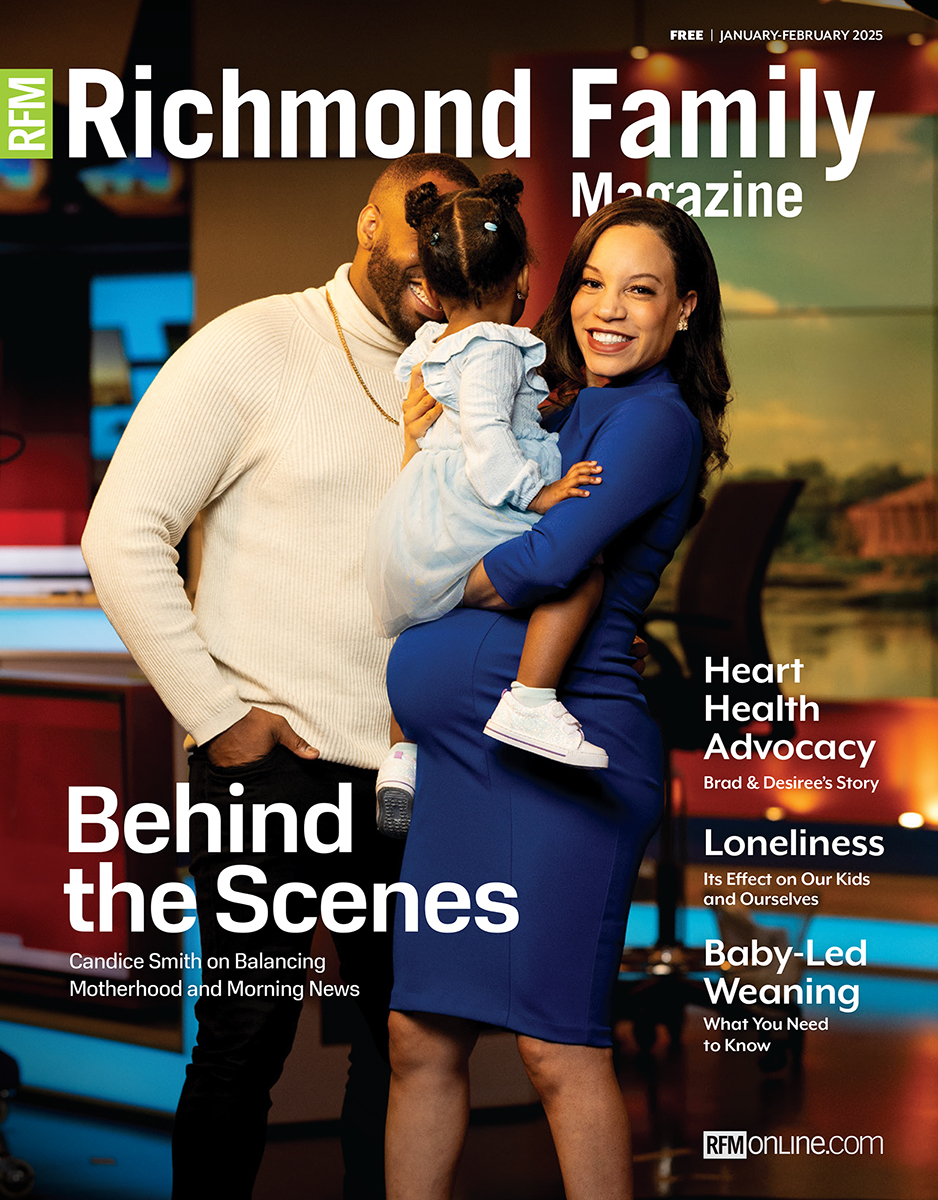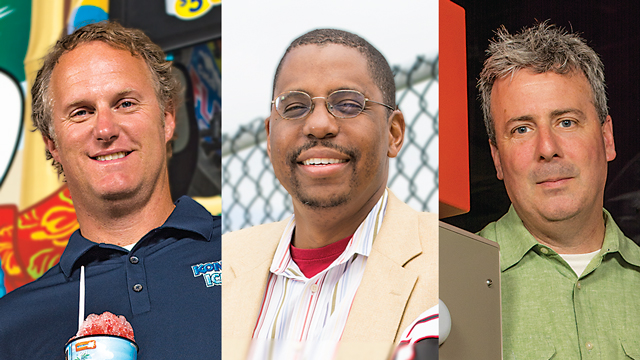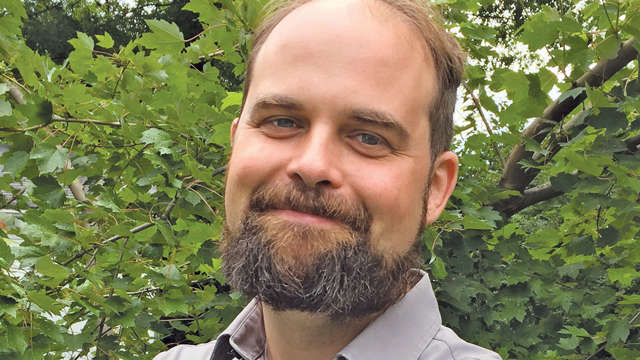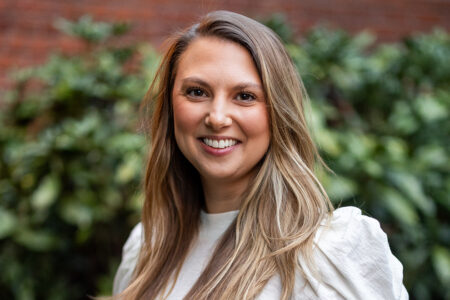Dads stand by us, protect us, and guide us. We look up to them. And even though we might not realize it now, a lot of that sage advice they are dishing out is sinking in. This month, as we celebrate Father’s Day, we thought it would be enlightening to check in with three Richmond-area dads and see how they navigate one of life’s most important journeys – fatherhood.
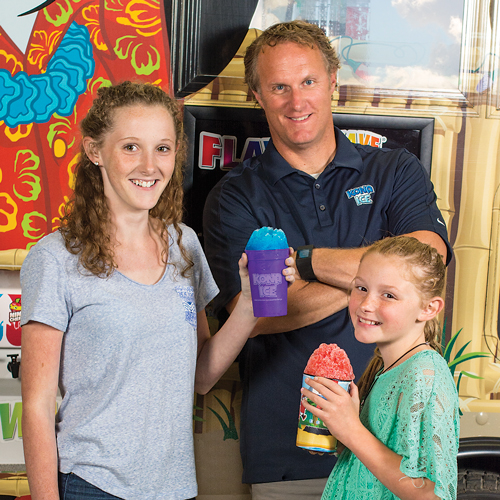 tim dearing “Our first couple of years in this business… I was not around as much, but I could see the future of the business, and that it would allow me to be with my kids more by freeing up time.”
tim dearing “Our first couple of years in this business… I was not around as much, but I could see the future of the business, and that it would allow me to be with my kids more by freeing up time.”
The one lesson Tim Dearing, owner of Kona Ice Central Virginia, hopes to teach his two daughters – Kaya, ten and Samantha, thirteen – is the value of paying it forward. It’s a fundamental principle that Tim holds close to his heart.
When he started his business six years ago, he decided to use the company’s trucks for fundraisers. “I wanted to give back to the community in any way we could,” he says. “For nonprofits like schools, churches, and youth organizations, it was a home run. We’ve now given a little over $500,000 back to the community.”
His pay-it-forward mindset carries over to the family’s personal life. A few years ago when his neighbor Beth Oliver found herself with a $6,000 copay after being diagnosed with cancer, Tim and his family stepped in to help. Tim hosted an event using one of his Kona Ice trucks and gave 100 percent of the proceeds to Beth. His daughters made flyers and passed them out around the neighborhood. They raised about $3,500
to help her meet her deductible.
“It wasn’t just about giving her money,” Tim says. “It was about showing my kids the importance of paying it forward and giving back.”
Kaya proved that she is grasping the concept when Tim and the girls were checking out recently at a local Target. The young lady in front of them wanted to purchase some cosmetics, but discovered she didn’t have the money to pay for all of them. “Kaya gave me a nudge, and I told them to run the total and add it to my kid’s stuff,” Tim says. When they saw the family in the parking lot, the girl’s mother got out of her car and gave Tim a hug, and offered to pay the difference. “I said to just use the difference to do something for someone else when they see a need.”
Those types of firsthand experiences teach his daughters important lessons about selflessness. “We are not rich. Sometimes we live paycheck to paycheck, but it’s not always about the almighty dollar,” he says. “I think my kids in general realize that. They understand the benefit of being able to do something like that.”
Prior to opening his company, Tim worked for a subcontractor that provided concession services at Kings Dominion. After three years, he decided he wanted more flexibility so he could spend more time with his kids. He originally bought two Kona Ice territories, but has since purchased another, expanding his territory from Caroline County to Prince George to Henrico’s West End. “Our first couple of years in this business, it was all about growing the business,” he says. “I was not around as much, but I could see the future of the business, and that it would allow me to be with my kids more by freeing up time. That was a no brainer for me.”
Tim is the kind of dad who advocates family time sans technology. “The generation growing up is more involved in having a cell phone glued to their fingers. I don’t encourage that,” he says. “I think being hands-on has been lost with this generation of kids and parents. Everyone is overworked and more stressed.”
The family has a quiet dinner together at least four or five nights a week with no television blaring in the background. “I grew up in the old school – my folks were the same way then. We had to turn off electronics,” Tim says.
Vacations are also no-electronics zones. “We do try to go on vacation in the summer, but our business is summer-based,” Tim says. “The kids go to my in-laws in Florida for two weeks in the summer. We also take a family trip to Smith Mountain Lake or somewhere like that.”
Weekends are family time, he adds. “We always plan something to do with the kids.”
Both girls are involved in sports. Samantha plays softball for Our Lady Of Lourdes School three to four days a week, and Kaya swims at Burkwood Swim & Racquet Club and with her Hanover neighborhood swim team. “I never wanted to sign her up for that,” Tim says, referencing what is a familiar swim team story for area families. “Typically swim meets go to midnight, but she is an amazing swimmer. I don’t know where she gets her swim technique. She’s like a little fish.”
Tim and his wife, Andrea, have also taught the girls the importance of spending money wisely. “We provide avenues for them to earn money by doing chores,” Tim says, noting the girls do the 52-week challenge where they have to put a growing amount in savings each week. For example, the kids chip in a dollar the first week, and fifty-two dollars the last week of the year. If they complete the challenge, their parents match the amount they saved.
“We want to teach them about savings, and that is something that is lost,” Tim says. “They enjoy it. If they can learn those types of things at an early age, they can both grow into good people.”
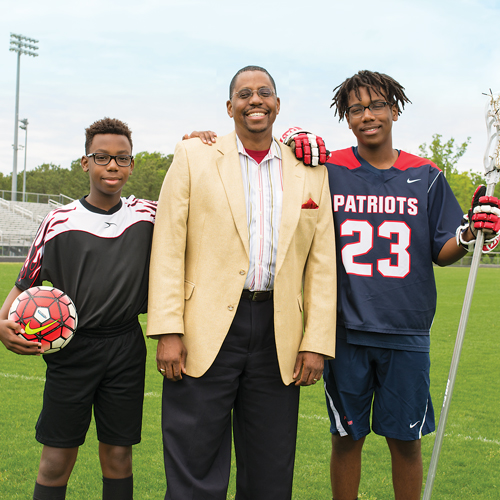 james wilson “There is no playbook to be a parent… I look at it as you are never finished. I think my sons are good citizens and good folks.”
james wilson “There is no playbook to be a parent… I look at it as you are never finished. I think my sons are good citizens and good folks.”
James Wilson, treasury manager at Performance Food Group, made a decision early in his career to seek balance in his family and work life. “I’ve always been in the corporate finance industry,” he says. “I didn’t want to go into investment banking or consulting where I would have a lot of travel. My job is not nine-to-five, but it’s definitely not eighty hours a week.”
His goal has always been to be involved with his two sons, Grant, twelve, and Miles, eighteen. His wife, Jamelle, was the former school superintendent in Hanover and is now dean for professional and continuing studies at University of Richmond. “My wife’s career has certain demands,” he says. “Early on, I wanted to make sure we could be parents together. I wanted and needed to have flexibility in my job for whatever had to happen to take care of our two sons. I wanted to be involved and stay involved with our children.” Jamelle was working on her doctorate when the boys were younger, creating more time for James to focus on the children. “There were times when it was just me and them, when it might not have been the case otherwise,” James says.
The couple shares parenting responsibilities. “We try to look at each other’s calendar. We take time off to go to our sons’ events,” James says.
The boys are both involved in church and sports; Grant plays soccer and Miles plays lacrosse. “Both of them were in the band at Liberty Middle School when they were younger,” James says.
He feels it’s important that he attend his sons’ events to support them, especially now that Miles will be graduating from Patrick Henry High School this month and going to college in the fall. “I try to enjoy the opportunities that are there to cheer him on,” James says. “I am more focused on
that now.”
Time has gone by quickly, and James realizes that the experiences he has with his sons do add up. “I planted the seed with them when they were five or six,” he says of being with them. “I think I spend a lot of time with my sons.”
As a family, everybody is busy running here and there, but they always come together in their Hanover home to watch Jeopardy. “When the kids were younger, after we had dinner, we would watch Jeopardy. That was the routine,” James says, adding, “it’s amazing to me to see the development of my children. Now our 12-year-old is answering more questions than I am.”
The family also attends St. Paul’s Baptist Church in Henrico together, and they go out to eat together. “We enjoy each other’s company,” James says. “Every year, we are taking road trips to cities such as Philadelphia, Baltimore, Washington, D.C., and New York.”
When he has time, James likes to discuss interesting articles he has read with his sons. “The kids will always roll their eyes, and probably think to themselves, ‘Dad has something else for us to read,’” he says.
James learned many lessons from his father who passed away when James was twelve. “Even in those short twelve years, I think my father was a great example of the things I’ve talked about, like how to love your family, be involved in church, help your neighbors, and be fiscally responsible,” he says. “I hear Dad sometimes when I talk, and I think he’s talking to his grandsons through me. It’s a little scary, but I guess
I was listening to what he said.”
There are times when James questions if he has done enough as a dad. “There is no playbook to be a parent,” he says. “I look at it as you are never finished. I think my sons are good citizens and good folks. I have no big regret, but I still wonder, ‘Could I have done this or that better?’”
James strives to be a good example for his sons, especially “when I am showing them how I would like for them to be,” he says. “When I am being a good husband and a good father, when I’m being supportive, and when I am treating people like I want to be treated – by loving your neighbor.”
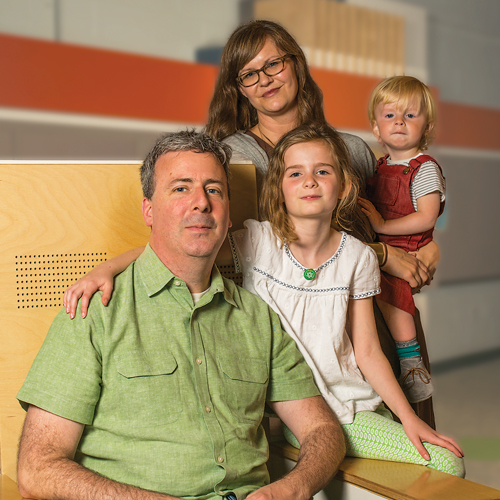 John Sarvay “Dad was of an older generation, a 100 percent working dad for 80 percent of his life.
John Sarvay “Dad was of an older generation, a 100 percent working dad for 80 percent of his life.
I drew different lessons from that experience. I want to be fully present with my kids and available for them.”
John Sarvay’s work at the company he founded, Floricane – teaching companies about strategic planning and organizational change – is similar to his role as dad to 8-year-old Thea and 20-month-old Jack. “We work with organizations examining their future, what their needs are, and what they need to accomplish that,” he says, noting that as a father you additionally need to know things like “how you pace your time, how you apologize for mistakes, and how you move forward.”
He talks about the similarities in his monthly e-newsletter about being a dad, Playground Perspective. “There are so many correlations of what I am doing as a dad and what I am asking corporations to do,” he says. “You have to pay attention to the impact you have on people, whether it’s your 8-year-old daughter or a 32-year-old employee.”
John started his company in 2008 when his daughter was eight months old. “When Thea was born, I was working at Luck Stone and we could afford for [John’s wife] Nikole to stay at home,” he says. “When I started the business, we had some hard conversations around the tradeoffs of a dad with a start-up company and a stay-at-home mom versus a working mom. We looked at how much money she would earn, and what we would net. At the end of the month, it didn’t make sense for her to work full-time.”
Both John and Nikole wanted Thea to be raised with her mom present during the day. It meant a lot to John to be able to come home from work and hear about his daughter’s day from his wife. It was a time of family connection. Nikole did go back to work when Thea started kindergarten, but
is back home now with Jack.
Spending quality time with their children is important to the couple. John tries to limit his evening engagements in order to be home by five-thirty so the family can fix dinner together. Now that the weather is warmer, they take walks around their Northside neighborhood. Jack rides in the stroller, and Thea keeps up on her scooter.
“We have a 3-hour block in the evening where we hang out as a family and play, cook, and eat,” John says. “We try to keep to the rhythm. We don’t change it out a lot.”
John’s parents divorced when he was seven. He and his two siblings lived with their mom. “I had a mother who worked really hard, and was strong in her determination to raise her kids well,” he says, noting that his mom taught him not only the value of hard work, but also the importance of creating interesting experiences for your kids that will help expand their perspective.
His father loved him “but was emotionally detached and focused on other things initially,” he says. “Dad was of an older generation, a 100 percent working dad for 80 percent of his life. I drew different lessons from that experience. I want to be fully present with my kids and available
for them.”
John and his family often take trips to places such as Jamestown, Williamsburg, and Washington D. C., and turn them into learning experiences for Thea, who is interested in everything from math to art. “That makes it easy for us,” he says referring to his daughter’s varying interests. “Anywhere we go, we can find something fun and interesting for her. She soaks it up like a sponge.”
Some weekends, the family will find innovative recreational opportunities around Richmond. During spring break, John and Thea rode around town on GRTC buses. They had breakfast downtown, and lunch in Carytown, where Thea scored a book and a toy before taking a bus home.
John admits that maintaining work/life balance can sometimes be challenging. After working with business leaders all day, he can be tired when he heads home. “It’s easy to be really cranky, or start thinking that we have to hurry up and get things done, to become task-focused,” he says. “When I come home at night, the kids are not interested in tasks that need to be done or that their dad is grumpy. They are looking for Dad to come home and be with them.”
That’s why the most important thing for John to do in the evening is connect with his family. “I can get swept up with what’s in front of me when I have spent time with groups all day,” he says. “I have to be aware of the energy I am bringing into the house with me.”
What does he want his kids to learn from him? “I hope that they learn the value and importance of community and family,” he says.

